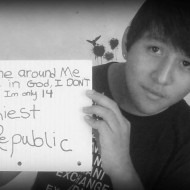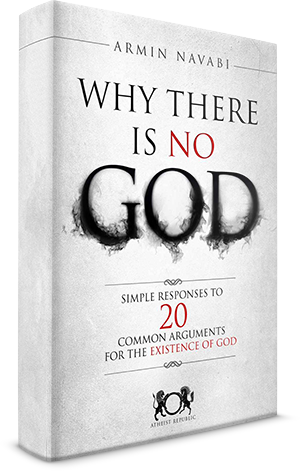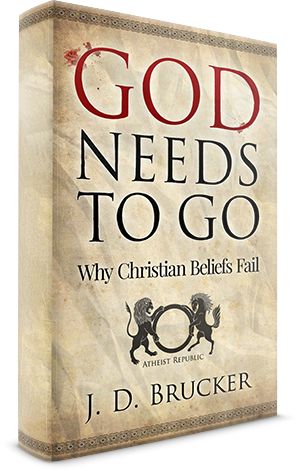Is it unreasonable to believe in a Creator? It doesn't seem unreasonable to me. Here's my train of thought, a piece at a time:
1. In every case where the origin of a thing is known and undisputed, somebody dreamed it up and made it happen. Agreed?
Subscription Note:
Choosing to subscribe to this topic will automatically register you for email notifications for comments and updates on this thread.
Email notifications will be sent out daily by default unless specified otherwise on your account which you can edit by going to your userpage here and clicking on the subscriptions tab.





























Gerry ....
I hope this is not going to be the "Kalam" argument .....again!
"Is it unreasonable to believe in a Creator? "
It is both unreasonable and unnecessary.
"agreed ?" .... NO!
Consider , for example , a cloud ....
However what might be a more significant question is ,"Why do you NEED there to be a creator"
Sorry for the confusion. At this point I'm only asking for agreement on my major premise, not my conclusion. Specifically:
1. In every case where the origin of a thing is known and undisputed, somebody dreamed it up and made it happen. Okay so far?
On your point number 1. I disagree, for it is not true that in every case where the origin of a thing is known and undisputed, somebody dreamed it up and made it happen. In cases where things are known and undisputed it is often the case that they were discovered not dreamed up and made to happen. Often times though things that are not known but rather speculated, theorized or believed to be true and these things can go unquestioned until someone comes up with a better theory or evidence that opposes this belief, speculation or theory It is also possible and quite common for unsound reasons for someone to find doubt or believe otherwise. With lack of evidence it is hard to truly know anything one way or the other however one can believe whatever they want to. All said believing something does not make it true.
Zaphod says: On your point number 1. I disagree, for it is not true that in every case where the origin of a thing is known and undisputed, somebody dreamed it up and made it happen.
Gerry: Please supply an example of something whose ORIGIN is both known and undisputed that was not the result of somebody dreaming it up and making it happen.
Zaphod says: In cases where things are known and undisputed it is often the case that they were discovered not dreamed up and made to happen.
Gerry: It's not a question of the EXISTENCE of the thing being known and undisputed, but the ORIGIN of the thing being known and undisputed.
Zaphod says: All said believing something does not make it true.
Gerry: Indeed. But that's a topic for a different thread; or perhaps later in this thread. All I'm trying to establish now is that it is not unreasonable to believe in a Creator. In three simple steps. I'll repeat the first of those steps here as a convenience to later posters (including, I hope, you):
1. In every case where the origin of a thing is known and undisputed, somebody dreamed it up and made it happen. Agreed?
in response to Gerry's first two reponses to my lines: Well some elements like we know have their origins in nuclear fusion reactions sometimes created in labs or reactors and sometimes in the fusion reactions that come about under ideal circumstances present in stars ununoctium is one example but in fact most elements (all but a few) are created in such reactions and were discovered (not dreamed up or or made to happen with exception to the man made reactions where we created such reactions) as a result of the study into elements formed in such reactions. Watchmans cloud example works too you may discover a cloud and even science can account for its origin but it was not dreamed up or made to happen by anyone.
Conceptual origins are an example of origins being dreamed up or made to happen. There has been a significant amount of study into word origins we also have many word origins and even story origins like for example many of the biblical stories like those of the great flood and the ark. These how ever were stories and words dreamed up and made to happen by people.
By the way I am keeping an open mind to your topic and allowing for you to make the argument that it is not unreasonable to believe there is a creator but you will have to go somewhere with this quick because your losing me. The way you dismissed Watchman's answer and example and then used his approach in responding to me says your going to be difficult to have a reasonable debate with. I seems your not going ot acknowledge disagreement even on solid ground that your introductory point is invalid. This being said do you have somewhere else you can go with this without using it as the backbone of your debate.
No Gerry NO ... I point you at my prior example.... A cloud.
its origin is known and undisputed (look up water cycle)
and yet it was "dreamed up" by no-one.
watchman says: No Gerry NO ... I point you at my prior example.... A cloud. its origin is known and undisputed (look up water cycle).
Gerry: The origin of clouds is disputed. Some say they're part of a intricately designed and integrated cosmos, some say part of a spontaneously emergent cosmos. We'll get to things like clouds when we get to my second point. But first we have to agree that:
1. In every case where the origin of a thing is known and undisputed, somebody dreamed it up and made it happen. Yes?
Note: Gerry we were open to debate with you while it was believe you could be reasonable but at least for me I am quickly lossing faith in you ability to be so, when I no longer engage with you please remember this is why. get it through your head we don't agree with your point 1. You say yes, we say no. if you can't continue further without agreement then this conversation will go nowhere.
Perhaps you could try wording what you say differently. We may find it more agreeable stated in a different manner.
Zaphod says: Perhaps you could try wording what you say differently. We may find it more agreeable stated in a different manner.
Gerry: The best can do is provide some examples and elaborations:
"Things whose origin is known an undisputed" INCLUDES most (if not all) human artifacts: books, cars, donuts, etc.
"Things whose origin is known an undisputed" EXCLUDES most (if not all) naturally occurring things, because the origin of these is often and widely disputed: some say they are the result of an elaborate and integrated design, others say they are the result of spontaneous emergence. This very site is full us such disputes. And all schools of thought admit to the inconceivable at the very start: a self-existent creator, or nothing, or a singularity, or whatever: all things that have never been observed and cannot be fully and rationally conceived. So the origin of naturally occurring things is thus not only disputed, but unknown (ie, not fully conceivable) as well.
Which leaves us with my original premise:
1. In every case where the origin of a thing is known and undisputed, somebody dreamed it up and made it happen. Agreed?
In answer to your # 1 no one knows. If you claim that you do know this answer Gerry then put it forth. We can move on from there.
Ellie Harris says, In answer to your # 1 no one knows. If you claim that you do know this answer Gerry then put it forth. We can move on from there.
Gerry: Perhaps an example will help. I know who wrote this post: me. And no one, as far as I know, is disputing that. So this post is an example of something whose origin is both known and undisputed. I also know how I did it -- I thought it up, and typed it in. So, at least in this case, "somebody dreamed it up and made it happen." Now, when I look around, I find that it's not just in this case, but in every case where the origin of a thing is known and undisputed, that somebody dreamed it up and made it happen: axioms, books, cars, donuts, erasers, flutes, etc; many such things for each and every letter of the alphabet. And so, once again, I return to my major premise:
1. In every case where the origin of a thing is known and undisputed, somebody dreamed it up and made it happen. Agreed?
"So why, then, do I bother to oppose Dr. Dawkins? Because God, in His wisdom, ordains not just the end, but the means. My little book and my challenge, I believe, is one of the means God is using to accomplish the salvation of the lost and the edification of the saints. In other words, I see an opportunity here to participate in God's work -- to play a positive role in His design. Who, in their right mind, would turn down a part like that?"
Ladies & Gentlemen ..... We have a celebrity with us.....
Poet ,author , song writer ,musician , computer programmer ( in the sense of writing programming languages) , self proclaimed creator and all round clever dick ...
This is the guy who tried to buy his way into a debate with Dawkins ....
http://arizonaatheist.blogspot.co.uk/2008/04/more-riding-on-dawkins-coat...
There will be no true debate with this individual ... no answer will ever be adequate for his twisted "logic" ..."The origin of clouds is disputed"...... I believe we've all met this type before just not on this guys scale...
Personally I will not be taking part in this ...
I'll take the advice of the late un-lamented Kenny Marken and just ...not bother.
Here's a better and more complete link, Watchman: http://pleiotropy.fieldofscience.com/2009/04/rzeppa-game-show.html
Gerry, watchman argument is valid but maybe it is disputed for you.
So let us make it more simple for you.
"1. In every case where the origin of a thing is known and undisputed, somebody dreamed it up and made it happen. Agreed?"
No
A black eye on your face coming from my fist has a known origin and undisputed.
I did not have to dream it up, it just happened naturally because I was drunk.
Does that prove to you how ridiculous your fists premise was?
Maybe the black eye has placed some logic back to your brain with the trauma :P
Jeff Vella Leone: A black eye on your face coming from my fist has a known origin and undisputed. I did not have to dream it up, it just happened naturally because I was drunk.
Gerry: Now that's pertinent response. Well tried. But I disagree. You "dreamed it up" when you aimed (ie, pictured the outcome of your swing in advance, which indicates both a plan and purpose), and you "made it happen" when you actually and willfully swung (in an attempt to bring your plan to fruition). How much you later remember of that process, and your moral responsibility for thinking and acting so, are issues outside the scope of this particular thread.
Man, you are incredibly stupid, which part of the word DRUNK did you miss.
I was drunk and didn't even know I hit you.
I did not dream it.
I did not even know you were there.
You are assuming that accidents are all thought of beforehand in out head.
You are also assuming that our actions and effects of our actions are all thought of in advance.
If i spill my coffee by accident you are claiming that I thought of it beforehand.
Nonsense.
Sorry if I mistook what I said. No one knows if the cosmos is a thought made manifest by a creator. If you claim to know if that is the case then demonstrate that Gerry.
Gerry Rzeppa - Here's a better and more com"1. In every case where the origin of a thing is known and undisputed, somebody dreamed it up and made it happen. Agreed?"
This is a tautology because for any example that does not fit, you will just dispute it's origin, therefore removing it (in fact you have already done this with the example of clouds).
watchman - "I hope this is not going to be the "Kalam" argument .....again!"
Nailed it ^^^
Ellie Harris: Sorry if I mistook what I said. No one knows if the cosmos is a thought made manifest by a creator.
Gerry: Agreed.
Ellie Harris: If you claim to know if that is the case then demonstrate that Gerry.
Gerry: I don't claim to know that is the case in any provable sense, nor do I think such a thing (or it's converse) is provable by anyone: the theist doesn't have access to the necessary data, and no rational atheist would attempt to prove so general a negative. But I do BELIEVE that the cosmos is, as you so poetically put it, "a thought made manifest by a creator." My purpose in this thread is simply to show that such a belief is not unreasonable given the data we do have access to; and, if we can get that far, to show that such a belief is simpler, more familiar, and more practical than any competing hypothesis. But of course I can't get anywhere until I get agreement on my major premise:
1. In every case where the origin of a thing is known and undisputed, somebody dreamed it up and made it happen. Yes?
Nyarlathotep says: [Your point #1] is a tautology because for any example that does not fit, you will just dispute it's origin, therefore removing it (in fact you have already done this with the example of clouds).
Gerry: No, it's not enough for just little old me to dispute the thing; the controversial nature of the phenomenon must be widespread and well-known. But allow me to meet you half-way. Here is a weaker major premise that I think I can still use to make my argument:
1. In MANY CASES where the origin of a thing is known and undisputed, somebody dreamed it up and made it happen. Yes?
I am too willing to go along with the "In many cases" scenario.
So moving on to point number two, in a reply to someone else you wrote:
"here's point #2:
2. In many cases where the origin of a thing is unknown and/or disputed, the thing nevertheless bears all the hallmarks of somebody dreaming it up and making it happen. Agreed?"
As number 2 is stated I don't agree here, perhaps if you elaborate on the hallmarks you consider of someone dreaming it up and making it happen I could bring my self to work with it. Though I feel this might be more difficult then the first one.
Gerry: "1. In MANY CASES where the origin of a thing is known and undisputed, somebody dreamed it up and made it happen. Yes?"
Sure, for the sake of argument I'll agree to that one. But I suspect you are now building your house on sand, since any conclusions you make about X, we will just say X is one of the exceptions provided for in your first premise. For example:
Premise 1: MANY apples are red.
Premise 2: John has an apple.
Conclusion: John's apple is red.
This conclusion does not follow since John's apple could be one of the non-red apples allowed for in premise 1.
Gerry: "1. In MANY CASES where the origin of a thing is known and undisputed, somebody dreamed it up and made it happen. Yes?"
Nyarlathotep: Sure, for the sake of argument I'll agree to that one. But I suspect you are now building your house on sand, since any conclusions you make about X, we will just say X is one of the exceptions provided for in your first premise. For example:
Premise 1: MANY apples are red.
Premise 2: John has an apple.
Conclusion: John's apple is red.
Gerry: Actually, my argument is more of this form:
Premise 1: MANY apples are red.
Premise 2: John has an apple.
Conclusion: It is not unreasonable to believe that John's apple MAY BE red.
So here's point #2:
2. In many cases where the origin of a thing is unknown and/or disputed, the thing nevertheless bears all the hallmarks of somebody dreaming it up and making it happen. Agreed?
Lets say in the case of John's apple there are many red apples but there are many more golden yellow and green apples and only a small percent of the apples as a whole are red say .00001 it may be true that there is a chance John's apple is red but it would not be reasonable to bet that this was the case. Without further information it would be reasonable to wager a bet that John's apple was another color.
Gerry- Conclusion: It is not unreasonable to believe that John's apple MAY BE red.
You have provided no guidelines to what constitutes what is reasonable and what is not. Therefore you will always be able to argue any belief you like is reasonable, while any belief you do not like is unreasonable. So again you are setting up a tautology. No thanks.
Zaphod: As number 2 is stated I don't agree here, perhaps if you elaborate on the hallmarks you consider of someone dreaming it up and making it happen I could bring my self to work with it. Though I feel this might be more difficult then the first one.
Gerry: Let's say I come home and find a bunch of marbles in my front room, arranged into letters, which in turn are arranged into words, which spell out the sentence, "Welcome Home Dad". I'm going to suspect that somebody thought that up and made it happen since (1) such an arrangement (a) admits of a short description yet (b) is highly unlikely to occur by chance; and (2) since the arrangement is composed of well-matched, interacting parts (the letters) that contribute to the basic functioning of larger parts (the words, which, in turn are well-matched, interacting parts that contribute to the whole sentence), where the removal of any significant portion of the parts (at either level) would result in the failure of the whole arrangement. In short, I use the same criteria everyone uses -- explicitly or implicitly -- to spot human artifacts in the world.
I hope that helps. Here's the second point again:
2. In many cases where the origin of a thing is unknown and/or disputed, the thing nevertheless bears all the usual hallmarks of somebody dreaming it up and making it happen. Agreed?
Gerry: 2. In many cases where the origin of a thing is unknown and/or disputed, the thing nevertheless bears all the usual hallmarks of somebody dreaming it up and making it happen. Agreed?
LN: how many is many? If the origin of something is unknown, it's unknown. That does not mean it was made to happen. It only means how it happened is unknown.
I would say sure in many cases but I am willing to bet there are billions if not trillions and trillions more cases where things with unknown origin that bear no hallmarks of someone dreaming it up or making it happen. The universe is quite big there is a heck of a lot of unknown in it. heck even the earth is quite big and there is a heck of a lot of unknown on it.
CyberLN: LN: how many is many?
Gerry: Millions, if not billions of cases -- or more.
CyberLN: If the origin of something is unknown, it's unknown.
Gerry: Agreed.
CyberLN: That does not mean it was made to happen.
Gerry: Agreed.
CyberLN: It only means how it happened is unknown.
Gerry: Agreed. The point here is that many such things (whose origin is unknown) "nevertheless bear all the usual hallmarks of somebody dreaming them up and making them happen." In other words, they have the same kind of characteristics as things we know for sure were intentionally created by somebody -- specifically, they (1) admit of a short description yet are highly unlikely to occur by chance; and (2) they are composed of well-matched, interacting parts that contribute to the basic functioning of larger parts where the removal of any significant portion of the parts would result in the failure of the whole arrangement.So back to my second point:
2. In many cases where the origin of a thing is unknown and/or disputed, the thing nevertheless bears all the usual hallmarks of somebody dreaming it up and making it happen. Agreed?
Pages